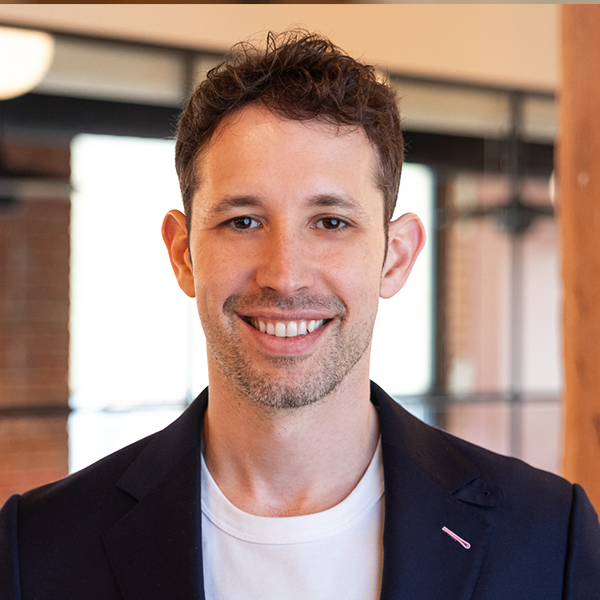Last month, we welcomed Aidan Gomez, CEO and Co-founder of Cohere, for our Scale Up series. As a leader in AI, Aidan co-authored the influential "Attention is All You Need" paper during his time at Google and has since co-founded Cohere, the leading data security-focused enterprise AI company. With the explosion of advancements in AI and its growing impact on industries worldwide, including drug discovery, our team was eager to hear Aidan’s unique technical perspective on building and scaling a cutting-edge AI company, the top trends driving AI innovation, and the challenges and opportunities that lie ahead. In this blog post, we delve into some key takeaways from our discussion, offering a valuable perspective for anyone interested in the future of AI.
From Google to Cohere: A Different Approach to AI
Aidan brings a unique perspective to the AI world, shaped by his time at Google and his subsequent co-founding of Cohere.
Aidan's time at Google highlighted a key difference between established tech giants and nimble startups: the ability to rapidly pivot and explore new applications. While Google nurtured the Transformer's creation, fully exploring its commercial potential before widespread adoption carried a different level of risk for a company of Google's scale. Established companies often need to be more cautious when introducing novel technologies, carefully considering the potential for public scrutiny and managing perception. Startups, on the other hand, have the freedom to take bolder risks and explore less-proven applications. Releasing the Transformer paper as open-source allowed for a more agile, community-driven approach to development, accelerating its impact across various fields.
This experience, coupled with a desire to foster an environment where groundbreaking research could flourish and a passion for bringing AI to diverse industries, ultimately contributed to Aidan's decision to co-found Cohere. At Cohere, he leverages the agility and customer focus of a startup to rapidly develop and deploy cutting-edge AI models, demonstrating the unique strengths of each environment in driving AI innovation.
The Need for Speed (and Scientific Rigor)
Throughout our Scale Up talk, Aidan highlighted the breakneck speed of AI innovation and the shrinking gap between research and real-world applications. New advancements are rapidly translated into production-ready models, driven by competition and a hunger for continuous improvement. This creates a dynamic environment where customer feedback fuels rapid iteration and pushes the boundaries of AI capabilities.
However, this accelerated pace also presents challenges. Aidan emphasized the difficulty of maintaining scientific rigor in evaluating AI models as the rapid dissemination of datasets can lead to inadvertent training on test data, potentially inflating performance metrics.
“You can’t really release a dataset because if you do, it will get trained on. And so the next cycle of models will be polluted.”
This underscores the critical need for robust and trustworthy evaluation methods to ensure accurate assessments and ethical development in the evolving AI landscape.
The Limitations of Off-the-Shelf Models and the Value for Businesses
During our discussion, Aidan's perspective on the evolving AI business landscape stood out. He highlighted that the real value of AI lies in its application. While foundational models are essential, "the highest growth area is the productization of models, not the models themselves," he said. Aidan stressed the importance of focusing on solving real customer problems using existing models. This involves creating robust, user-friendly interfaces and offering unique features, such as the data privacy and flexible deployment options that Cohere provides.
Crucially, Aidan emphasized that off-the-shelf models often fall short when it comes to solving specialized, domain-specific challenges. Fine-tuning models becomes strategically important when addressing highly specific needs unmet by existing models, thereby offering a unique value proposition based on proprietary data and expertise.
“If you’re in a very niche domain and you’re sitting on a corpus of data relevant to that domain, you will have longevity.”
This resonated deeply with our approach at BenchSci. We’ve witnessed firsthand how generic AI models struggle to grasp the nuances of drug discovery. That’s why we’ve dedicated ourselves to building domain-specific AI solutions tailored precisely to the complexities of this field. By weaving together cutting-edge AI with our proprietary datasets, streamlined workflows, and deep understanding of the drug discovery process, we empower scientists to make faster, more informed decisions. This ultimately accelerates the development of life-saving treatments and delivers tangible value to our customers.
Looking ahead, Aidan highlighted the revolutionary potential of AI models with iterative reasoning and problem-solving capabilities. He believes this shift towards models that learn and adapt will unlock entirely new approaches and dramatically expand AI's applications across various fields. This adaptability, coupled with an awareness of the field's fast-paced nature, will be vital for navigating the future of AI.
Like Aidan and the team at Cohere, we at BenchSci believe in the transformative power of AI. Our team is driven to revolutionize drug discovery and improve global health, and hearing from leaders like Aidan inspires us. I’m grateful he made the time to share his experiences with our team.
Explore our Scale Up series for more insights on navigating the challenges and opportunities of building a successful company.
